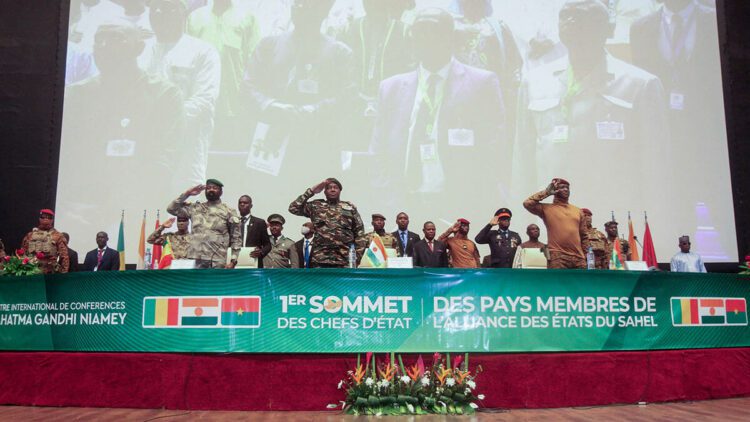At the recent ECOWAS summit, the military leaders of Niger, Mali and Burkina Faso ruled out their nations’ return to the West African regional bloc, a rejection that could jeopardise efforts to tackle coups d’état and curb the violence spreading across the region.
The leaders of the military juntas of the three countries announced this position during their first summit in Niamey, Niger’s capital, following their withdrawal from ECOWAS in January. This tripartite meeting took place a day before the African bloc’s summit in Nigeria.
The coup authorities of these three countries also accused the bloc of failing to fulfil its mandate by committing to consolidate its own union, the Alliance of Sahel States, an organisation created last year after the estrangement of its regional neighbours.
The head of Niger’s military government, General Abdourahamane Tiani; Malian Colonel Assimi Goita; and Burkinabe Captain Ibrahim Traore show the documents of the Confederation of Sahel States (AES) they signed during their first summit in Niamey July 6, 2024 – PHOTO/AFP
For Niger’s military leader, General Abdourahmane Tchiani, ECOWAS, established almost 50 years ago, has become “a threat” to the Sahel countries. For this reason, Tchiani insisted on moving forward with the Alliance of Sahel States, “instead of an ECOWAS whose directives and instructions are dictated to it by powers outside Africa”,
This meeting between the three Sahelian countries shows the deep division within ECOWAS, a bloc that, despite its efforts to remain united, is seeing growing internal tensions. However, as Karim Manuel, Middle East and Africa analyst at The Economist Intelligence Unit, points out to AP, mediation attempts are likely to continue, particularly led by the new Senegalese government, although “they will not bear fruit in the near future”.
For Senegalese President Bassirou Diomaye Faye, reconciliation is possible. “We must do everything possible to avoid the withdrawal of these three brotherly countries from ECOWAS,” Faye said, noting that reforms were necessary in order to “adapt ECOWAS to the realities of our times”.
The Alliance of Sahel States, formed in September last year, has been presented and promoted by Niger, Mali and Burkina Faso as a platform for seeking new partnerships with countries such as Russia and consolidating their independence from former colonial power France, which they accuse of influencing ECOWAS. Also in this sense, these three countries have expelled French troops, facilitating Russia’s military expansion in the region.
The military leaders who govern Burkina Faso, Mali and Niger formed a new confederation on July 6, 2024 by signing a treaty during their first summit in Niamey, after severing ties with ECOWAS – PHOTO/AFP
At the recent Niamey meeting, Burkina Faso’s leader, Captain Ibrahim Traoré, reaffirmed these issues and accused foreign countries of exploiting Africa. “Westerners consider that we belong to them and that our wealth also belongs to them,” Traoré said, according to AP. “They think they are the ones who should keep telling us what is good for our states,” he added.
The capital Traoré assured that this stage “is over forever”, as the resources of African countries will be for their people. “The attack on one of us will be an attack on all the other members,” said Mali’s leader, Colonel Assimi Goïta.
The Sahel alliance, after electing Goïta as its leader, signed a pact in which the three countries pledged to create a regional parliament and a bank similar to those run by ECOWAS. They also pledged to pool their military assets to fight insecurity in their countries.
On the other hand, ECOWAS during its summit warned of the “disintegration” facing the region following the formation of the Sahel alliance. According to the head of the Commission, Omar Alieu Touray, after the withdrawal of Mali, Niger and Burkina Faso, these countries risk “political isolation”, losing millions of dollars in funding and hampering freedom of movement.
Nigeria’s President and ECOWAS Chairman Bola Ahmed Tinubu during the opening speech at the Economic Community of West African States (ECOWAS) summit in Abuja, Nigeria July 7, 2024 – REUTERS/MARVELLOUS DUROWIYE
These gaps will also increase insecurity and obstruct the work of the long-proposed regional force. ECOWAS has been discussing how it can fund a regional force to combat terrorism and restore constitutional order in Niger, the last of the three countries to suffer a coup d’état.
However, analysts point out that it is not only these three nations that feel alienated from ECOWAS. In recent years, the bloc has lost the support of its citizens, who in many cases have celebrated and supported the recent wave of coups in the region due to the lack of opportunities and high insecurity in their countries.
“ECOWAS is largely seen as representing only the interests of its members’ leaders and not the interests of the people,” Oge Onubogu, director of the Wilson Center’s Africa Programme, told AP.
Source link : https://www.atalayar.com/en/articulo/politics/niger-mali-and-burkina-faso-rule-out-return-to-ecowas-and-consolidate-alliance-of-sahel-states/20240708121824202494.html
Author :
Publish date : 2024-07-08 10:18:24
Copyright for syndicated content belongs to the linked Source.
